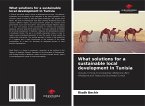Why did the postcolonial Tunisian state promise development? How do these promises reverberate in the hopes and dreams of Tunisians today? And how do they fit into contemporary global capitalist structures of exploitation? Starting from the everyday life at a French factory in Tunisia this book explores the relationship between the political economy of Tunisia, postcolonial promises of the Tunisian state and the hopes and dreams of Tunisians working in the factory. It argues for taking the concept of development seriously not as a desirable policy goal but as a multi-dimensional social and political fact: as the unfolding of global capitalism, as a postcolonial nation-state project, and as a personal everyday imaginary. The book employs a longue durée perspective that analyzes contemporary desires and expectations while tracing and placing them inside Tunisia's history. It thus contributes to our understanding of state-society relations and global capitalism in Tunisia.
Bitte wählen Sie Ihr Anliegen aus.
Rechnungen
Retourenschein anfordern
Bestellstatus
Storno








